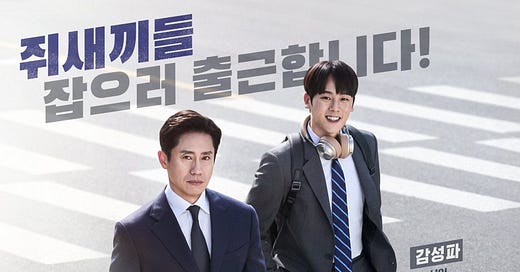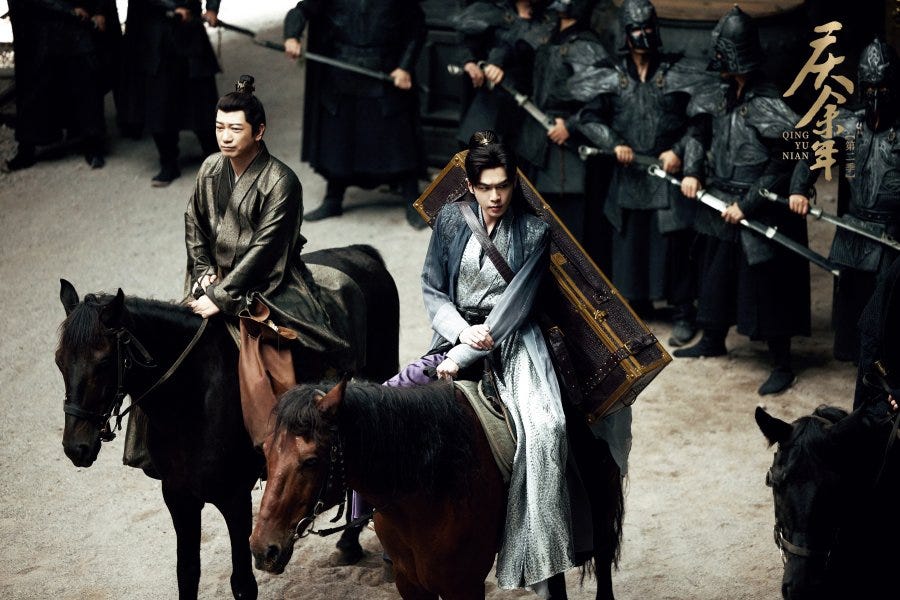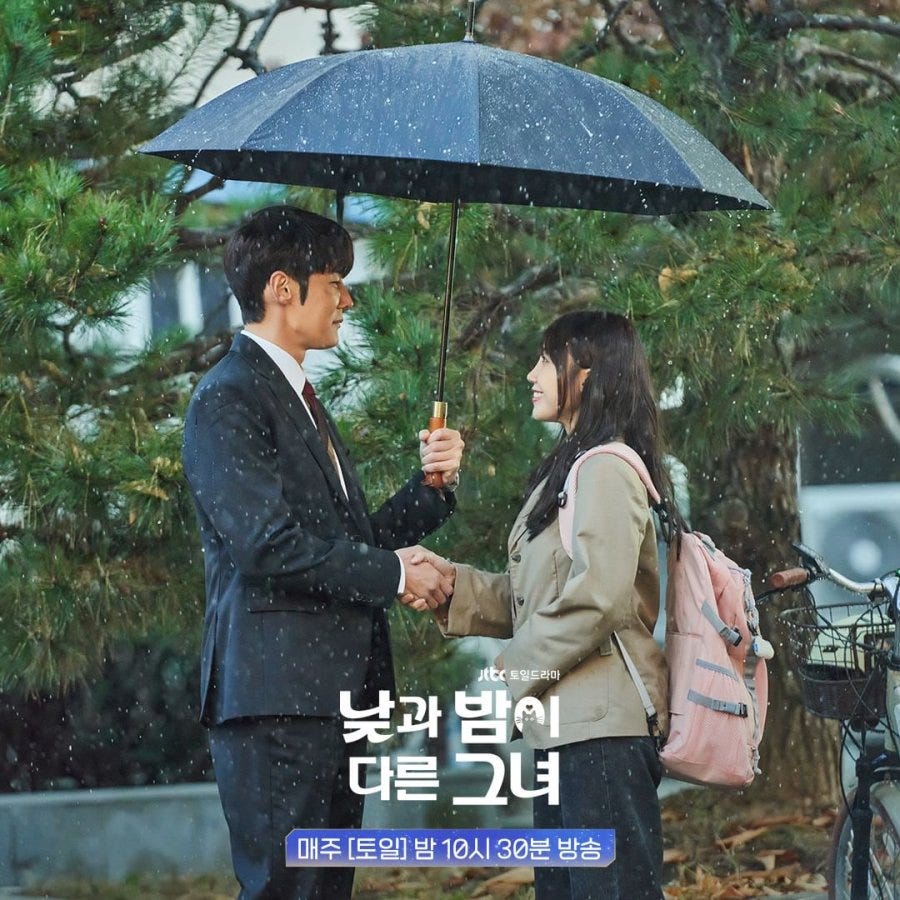Shin Jae-ha has been making some notable career choices since his return from compulsory military service. He’s still banking on his boyish good looks but reinventing his CV with antagonist roles. I mention this partly because he pops up in The Auditors briefly for a case involving an employee who attempts self-immolation in protest of bullying. It’s his word against the others so it isn’t entirely certain who should be believed. There’s something rotten wafting through the IT department’s ventilation shaft and the buck happens to stop with Shin Jae-ha’s character. Is the boyishly attractive, mild mannered head of IT and project manager of the company’s ambitious AI project all he seems to be? Well, that is the billion dollar question.
Wolves in sheep skin are a narrative trope as a old as the hills. Certainly as old as the Bible itself. Afterall, the devil himself saunters around as an angel of light rather than as a horned creature with a pitchfork. It’s not always immediately who the baddies are. Evil has many faces. And as the old adage says, one can’t judge a book by its cover.
This truism is a feature of The Auditors. The power struggle between the brothers that oversee JU Construction might compel the audience to take sides from the initial brouhaha of the early episodes. Who is the real villain of the piece? Is it Hwang Dae-ung or Hwang Se-ung? Afterall Hwang Dae-ung consider Shin Il-cha to be a royal pain in some part of the body. A stumbling block to getting things done. Wouldn’t Hwang Dae-ung be the obvious contender? Not so fast. Early impressions aren’t everything. There are hints that Hwang Se-ung might not be the affable reformist crusader he purports to be. Does the change he advocate necessarily mean only good things ahead for JU Constructions?
Although the company’s audit team is tasked to dig into aspects of the company that are non-compliant, soon individual members become targets of accusations. The nature of Seo-jin’s hiring soon comes under scrutiny because of her longtime association with Hwang Dae-ung. The charge is “unfair employment”. Is a hire necessarily wrong because someone with connections got the job? A merit-based system is supposed to alleviate some of those concerns valid though they may be. And a merit-based system does mean competition and competition means that there are winners and losers. The animating idea behind merit hiring is that the best person gets the jobs but who decides what constitutes “the best”. Moreover, what is the criteria? Recruitment is complex. Passing the interview is just one of many evaluation tools on offer.
There’s something similar going on in Joy of Life 2 during the all-important Imperial Exams. It frustrates the idealistic Fan Xian that everyone is trying to game the system. He meets a sampling of the struggling candidates who make their way to the capital every couple of years to take the exam that will determine the rest of their lives. Some are repeat candidates and there’s even one that looks like he’s got one foot in the grave. At this point in the narrative Fan Xian has been set up by the second prince in a continuing manichean struggle precisely because the latter knows that Fan Xian will either be forced to go along with the status quo or he will stick his head above the parapet and offend all the right people. Also things could go badly for Fan Xian if some mishap occurs during the exam and fatalities are the result of his “negligence”. Someone could tamper with the water, the candles, the building and even the toilets. Who cares, right? Fan Xian does. He has to. As he says to his future father-in-law, even if it’s just this one time, under his watch, he wants a level playing field. It’s amusing to watch Fan Xian try to cover all the bases and endure sleepless nights maintaining the integrity of the exam. He’s bogged down in details and procedures. But to those who are in the know minutiae is often what ultimately breaks government departments.
It’s true that talent alone is no guarantee of success in life. Neither is conscientiousness. Neither are talent and conscientiousness. With Fan Xian who has both, he also needs the connections even if he finds its distasteful. As the song says, we all need a little help from our friends. Without the backing of the highest in the land — the emperor, the prime minister, the chief of the investigation bureau and his own father — he would be rather ineffective in his crusade for “fairness”. What does it prove? That life is organized around power dynamics? Maybe. Maybe not. It’s more complex than that. Powerful connections, as we saw in this year’s Connection, go only so far. Relationships have to be established on trust to have permanency. Raw and pure expediency isn’t enough. Trust is the connective tissue of all relationships. Without it, no relationship can survive. That is why a well-known story like The Boy Who Cried Wolf resonates across cultures. Deception comes with a high price tag, worth more than its weight in gold. Once trust is undermined it is difficult for a relationship to survive. Without genuine affection for Fan Xian and his mother, the father figures are just movers and shakers with agendas.
In that light relationships are what I think trust structures — built over time and through adversity. Without sincerity or authenticity, connections can’t develop beyond the realm of transactions. At the first sign of trouble, these structures tumble down like a house of cards.
Miss Night and Day as it turns out is a product of good intentions and misspent currency. It’s a show that takes female-centred to an unconvincing place in view of the set-up and the characters. While the premise screams potential, the execution especially in the latter half is lacklustre. A hardworking, deeply discouraged civil service exam taker is disheartened from the setbacks. One evening she has an encounter with a cat and the next morning, she discovers that she’s aged overnight. Madness ensues when her parents think that some middle-aged weirdo has broken into their home and a chase follows. To add insult to injury Min-ji realises that she reverts to her twenty-something self when the sun sets. Choi Jin-hyuk plays Gye Ji-ung, an ace prosecutor the show’s main detective who is returning to his old stomping ground to reinvestigate his mother’s disappearance. Their paths intersect. By day, she’s Im Sun, clerical staff at the prosecutor’s office; by night she’s Lee Mi-jin, the witness to a murderer’s get away.
For about 8 episodes the show is fine for what it claims to be — a light hearted romp about a civil servant living a double life trying not to be found out by her nearest and/or dearest. Forced by circumstances, she confides in bestie and then her secret is chanced upon by K pop celebrity Ko Won who is doing community service at the prosecutorial office out in the boondocks. There’s a murderer on the loose and there are the usual suspects. But given the past and present connections to the crimes, the possible list of perpetrators narrows down considerably. Lee Jung-eun who plays the ahjumma Min-ji who takes her aunt’s name Im Sun, is undeniably stellar. Her experience and dedication to the craft shines through. Someone should hand her some kind of award/medal for doing most of the heavy lifting to elevate a slapdash script.
Unfortunately, somewhere after the halfway mark the show traverses into “doesn’t make any sense” territory in a big way probably to hammer home some of its cherished messaging that she can do anything if she only believes in herself. Part of it comes from the fact that the writer fails to integrate the crime aspect of the story with the fantasy/comedic aspects with confidence. Sure this is a fantasy show but even fantasy shows have rules. The fact that the show has cops and prosecutors means that it believes that procedure does and should matter. That the rule of law is a thing. Why bother with the day to day realities of law enforcement otherwise? Humour and fantasy isn’t an automatic license for an “anything goes” attitude. The show is very inconsistent about what procedures it’s a stickler for. It’s silly enough to let a middle-aged office worker participate in an undercover drug operation but it’s downright bizarre (not to mention irresponsible) to hang an entire case on her unofficial participation as the primary interrogator in a murder investigation when there are actual professionals who can do the job. Evidently the show pays lip service to world building.
Furthermore what was the point of the K pop lad, Ko Won again? Sure he’s eye candy for a very particular demographic but as a possible romantic interest, it’s a waste of air time that could be better allocated elsewhere. Not every show has to have a love triangle and this one was a nothingburger. It would have been, to my mind, a much better use of his character arc to parcel it to Choi Jin-hyuk’s Gye Ji-ung who is woefully underdeveloped. For one it takes him too long to find out Min-ji’s secret. Why should it even be a mystery at all? They could have worked together and that would have given the romance the build up it desperately needed rather than just relying on trope-esque slapstick and drunken moments to get the job done. The whole older woman and younger man gag could have worked in this instance as well. In fact probably even better considering how adamantly Ji-ung is initially against the idea of Im Sun as a replacement for the admin officer that was shown the door.
A lot of what makes the show less involving and why it makes less and less sense could be attributed to the fact that the writer was pulling every trick to prolong the so-called “big reveals”. It’s obvious that the story they wanted to tell wasn’t a 16 episode one although it could have been. Or in all likelihood the writer didn’t have the chops to pull it off with rigorous character work. I certainly don’t buy Min-ji’s reason for not telling Ji-ung about her dual identity especially when they start dating. Nor her subsequent reason for breaking up with him. Even the villain of the piece is pretty generic K drama stock. So much time is spent misdirecting the audience’s attention to the point that it becomes obvious who the perpetrator isn’t.
Apart from Min-ji’s parents, most of the side characters are window dressing. In the final analysis, it’s a message drama — although that gets a bit garbled at towards the end.
If you got something out of this post, please like, share, subscribe or leave a comment below. Thank you for reading.





